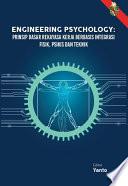
Manajemen Pengembangan Pendidikan Anak Usia Dini
Dilengkapi dengan Manajemen Perpustakaan dan Ekstrakurikuler
Pendidikan Anak Usia Dini merupakan pendidikan yang paling fundamental. Dimana menyiapkan anak usia 0-6 tahun agar siap memasuki pendidikan selajutnya. Dalam hal ini pengembangan manajemen pendidikan anak usia dini sangat diperlukan. Untuk perencanakan, pengorganisasian, pelaksanaan, dan pengawasan dalam sebuah lembaga PAUD. Hal tersebut tidak terlepas dari perhatian seluruh komponen yang terlibat di dalamnya. Proses pendidikan anak usia dini memerlukan pengelolaan yang efektif dan efisien serta perlu didukung oleh kepemimpinan pendidikan yang baik. Buku ini hadir untuk menjawab dan memenuhi kebutuhan tersebut. Dengan buku ini diharapkan seluruh komponen yang terlibat pada pendidikan anak usia dini lebih memahami betapa pentingnya manajemen untuk pengembangan pendidikan anak usia dini. Dalam buku ini terdiri dari 11 bab yang membahas tentang Manajemen Pendidikan Anak Usia Dini, Manajemen Pendirian PAUD, Manajemen Kurikulum PAUD (dokumen I), Manajemen Kurikulum PAUD (dokumen II), Manajemen Sumber Daya Manusia, Manajemen Sarana Prasarana, Manajemen Ekstrakurikuler I, Manajemen Ekstrakurikuler II, Manajemen Pembiayaan PAUD, Manajemen Pemasaran PAUD, Manajemen Perpustakaan PAUD.
- ISBN 13 : 6025790329
- ISBN 10 : 9786025790324
- Judul : Manajemen Pengembangan Pendidikan Anak Usia Dini
- Sub Judul : Dilengkapi dengan Manajemen Perpustakaan dan Ekstrakurikuler
- Pengarang : Eca Gesang Mentari, Mutia Rahayu, Mhd. Habibu Rahman, Puti Lestari, Aulia Rahma, Wahyu Purwasih, Nia Kurniasari, Nurhidayati, Dina Khairiah, Yuning Eka Rahma Wati, Muhammad Azam Muttaqin, Rita Kencana, Mutia Rahayu, Mhd. Habibu Rahman, Puti Lestari, Aulia Rahma, Wahyu Purwasih, Nia Kurniasari, Nurhidayati, Dina Khairiah, Yuning Eka Rahma Wati, Muhammad Azam Muttaqin, Rita Kencana, Mutia Rahayu, Mhd. Habibu Rahman, Puti Lestari, Aulia Rahma, Wahyu Purwasih, Nia Kurniasari, Nurhidayati, Dina Khairiah, Yuning Eka Rahma Wati, Muhammad Azam Muttaqin, Rita Kencana, Mutia Rahayu, Mhd. Habibu Rahman, Puti Lestari, Aulia Rahma, Wahyu Purwasih, Nia Kurniasari, Nurhidayati, Dina Khairiah, Yuning Eka Rahma Wati, Muhammad Azam Muttaqin, Rita Kencana, Mutia Rahayu, Mhd. Habibu Rahman, Puti Lestari, Aulia Rahma, Wahyu Purwasih, Nia Kurniasari, Nurhidayati, Dina Khairiah, Yuning Eka Rahma Wati, Muhammad Azam Muttaqin, Rita Kencana, Mutia Rahayu, Mhd. Habibu Rahman, Puti Lestari, Aulia Rahma, Wahyu Purwasih, Nia Kurniasari, Nurhidayati, Dina Khairiah, Yuning Eka Rahma Wati, Muhammad Azam Muttaqin, Rita Kencana, Mutia Rahayu, Mhd. Habibu Rahman, Puti Lestari, Aulia Rahma, Wahyu Purwasih, Nia Kurniasari, Nurhidayati, Dina Khairiah, Yuning Eka Rahma Wati, Muhammad Azam Muttaqin, Rita Kencana, Mutia Rahayu, Mhd. Habibu Rahman, Puti Lestari, Aulia Rahma, Wahyu Purwasih, Nia Kurniasari, Nurhidayati, Dina Khairiah, Yuning Eka Rahma Wati, Muhammad Azam Muttaqin, Rita Kencana, Mutia Rahayu, Mhd. Habibu Rahman, Puti Lestari, Aulia Rahma, Wahyu Purwasih, Nia Kurniasari, Nurhidayati, Dina Khairiah, Yuning Eka Rahma Wati, Muhammad Azam Muttaqin, Rita Kencana, Mutia Rahayu, Mhd. Habibu Rahman, Puti Lestari, Aulia Rahma, Wahyu Purwasih, Nia Kurniasari, Nurhidayati, Dina Khairiah, Yuning Eka Rahma Wati, Muhammad Azam Muttaqin, Rita Kencana, Mutia Rahayu, Mhd. Habibu Rahman, Puti Lestari, Aulia Rahma, Wahyu Purwasih, Nia Kurniasari, Nurhidayati, Dina Khairiah, Yuning Eka Rahma Wati, Muhammad Azam Muttaqin, Rita Kencana, Mutia Rahayu, Mhd. Habibu Rahman, Puti Lestari, Aulia Rahma, Wahyu Purwasih, Nia Kurniasari, Nurhidayati, Dina Khairiah, Yuning Eka Rahma Wati, Muhammad Azam Muttaqin, Rita Kencana, Mutia Rahayu, Mhd. Habibu Rahman, Puti Lestari, Aulia Rahma, Wahyu Purwasih, Nia Kurniasari, Nurhidayati, Dina Khairiah, Yuning Eka Rahma Wati, Muhammad Azam Muttaqin, Rita Kencana, Mutia Rahayu, Mhd. Habibu Rahman, Puti Lestari, Aulia Rahma, Wahyu Purwasih, Nia Kurniasari, Nurhidayati, Dina Khairiah, Yuning Eka Rahma Wati, Muhammad Azam Muttaqin, Rita Kencana, Mutia Rahayu, Mhd. Habibu Rahman, Puti Lestari, Aulia Rahma, Wahyu Purwasih, Nia Kurniasari, Nurhidayati, Dina Khairiah, Yuning Eka Rahma Wati, Muhammad Azam Muttaqin, Rita Kencana, Mutia Rahayu, Mhd. Habibu Rahman, Puti Lestari, Aulia Rahma, Wahyu Purwasih, Nia Kurniasari, Nurhidayati, Dina Khairiah, Yuning Eka Rahma Wati, Muhammad Azam Muttaqin, Rita Kencana, Mutia Rahayu, Mhd. Habibu Rahman, Puti Lestari, Aulia Rahma, Wahyu Purwasih, Nia Kurniasari, Nurhidayati, Dina Khairiah, Yuning Eka Rahma Wati, Muhammad Azam Muttaqin, Rita Kencana, Mutia Rahayu, Mhd. Habibu Rahman, Puti Lestari, Aulia Rahma, Wahyu Purwasih, Nia Kurniasari, Nurhidayati, Dina Khairiah, Yuning Eka Rahma Wati, Muhammad Azam Muttaqin, Rita Kencana, Mutia Rahayu, Mhd. Habibu Rahman, Puti Lestari, Aulia Rahma, Wahyu Purwasih, Nia Kurniasari, Nurhidayati, Dina Khairiah, Yuning Eka Rahma Wati, Muhammad Azam Muttaqin, Rita Kencana, Mutia Rahayu, Mhd. Habibu Rahman, Puti Lestari, Aulia Rahma, Wahyu Purwasih, Nia Kurniasari, Nurhidayati, Dina Khairiah, Yuning Eka Rahma Wati, Muhammad Azam Muttaqin, Rita Kencana, Mutia Rahayu, Mhd. Habibu Rahman, Puti Lestari, Aulia Rahma, Wahyu Purwasih, Nia Kurniasari, Nurhidayati, Dina Khairiah, Yuning Eka Rahma Wati, Muhammad Azam Muttaqin, Rita Kencana, Mutia Rahayu, Mhd. Habibu Rahman, Puti Lestari, Aulia Rahma, Wahyu Purwasih, Nia Kurniasari, Nurhidayati, Dina Khairiah, Yuning Eka Rahma Wati, Muhammad Azam Muttaqin, Rita Kencana, Mutia Rahayu, Mhd. Habibu Rahman, Puti Lestari, Aulia Rahma, Wahyu Purwasih, Nia Kurniasari, Nurhidayati, Dina Khairiah, Yuning Eka Rahma Wati, Muhammad Azam Muttaqin, Rita Kencana, Mutia Rahayu, Mhd. Habibu Rahman, Puti Lestari, Aulia Rahma, Wahyu Purwasih, Nia Kurniasari, Nurhidayati, Dina Khairiah, Yuning Eka Rahma Wati, Muhammad Azam Muttaqin, Rita Kencana, Mutia Rahayu, Mhd. Habibu Rahman, Puti Lestari, Aulia Rahma, Wahyu Purwasih, Nia Kurniasari, Nurhidayati, Dina Khairiah, Yuning Eka Rahma Wati, Muhammad Azam Muttaqin, Rita Kencana, Mutia Rahayu, Mhd. Habibu Rahman, Puti Lestari, Aulia Rahma, Wahyu Purwasih, Nia Kurniasari, Nurhidayati, Dina Khairiah, Yuning Eka Rahma Wati, Muhammad Azam Muttaqin, Rita Kencana, Mutia Rahayu, Mhd. Habibu Rahman, Puti Lestari, Aulia Rahma, Wahyu Purwasih, Nia Kurniasari, Nurhidayati, Dina Khairiah, Yuning Eka Rahma Wati, Muhammad Azam Muttaqin, Rita Kencana, Mutia Rahayu, Mhd. Habibu Rahman, Puti Lestari, Aulia Rahma, Wahyu Purwasih, Nia Kurniasari, Nurhidayati, Dina Khairiah, Yuning Eka Rahma Wati, Muhammad Azam Muttaqin, Rita Kencana, Mutia Rahayu, Mhd. Habibu Rahman, Puti Lestari, Aulia Rahma, Wahyu Purwasih, Nia Kurniasari, Nurhidayati, Dina Khairiah, Yuning Eka Rahma Wati, Muhammad Azam Muttaqin, Rita Kencana, Mutia Rahayu, Mhd. Habibu Rahman, Puti Lestari, Aulia Rahma, Wahyu Purwasih, Nia Kurniasari, Nurhidayati, Dina Khairiah, Yuning Eka Rahma Wati, Muhammad Azam Muttaqin, Rita Kencana, Mutia Rahayu, Mhd. Habibu Rahman, Puti Lestari, Aulia Rahma, Wahyu Purwasih, Nia Kurniasari, Nurhidayati, Dina Khairiah, Yuning Eka Rahma Wati, Muhammad Azam Muttaqin, Rita Kencana, Mutia Rahayu, Mhd. Habibu Rahman, Puti Lestari, Aulia Rahma, Wahyu Purwasih, Nia Kurniasari, Nurhidayati, Dina Khairiah, Yuning Eka Rahma Wati, Muhammad Azam Muttaqin, Rita Kencana, Mutia Rahayu, Mhd. Habibu Rahman, Puti Lestari, Aulia Rahma, Wahyu Purwasih, Nia Kurniasari, Nurhidayati, Dina Khairiah, Yuning Eka Rahma Wati, Muhammad Azam Muttaqin, Rita Kencana, Mutia Rahayu, Mhd. Habibu Rahman, Puti Lestari, Aulia Rahma, Wahyu Purwasih, Nia Kurniasari, Nurhidayati, Dina Khairiah, Yuning Eka Rahma Wati, Muhammad Azam Muttaqin, Rita Kencana, Mutia Rahayu, Mhd. Habibu Rahman, Puti Lestari, Aulia Rahma, Wahyu Purwasih, Nia Kurniasari, Nurhidayati, Dina Khairiah, Yuning Eka Rahma Wati, Muhammad Azam Muttaqin, Rita Kencana, Mutia Rahayu, Mhd. Habibu Rahman, Puti Lestari, Aulia Rahma, Wahyu Purwasih, Nia Kurniasari, Nurhidayati, Dina Khairiah, Yuning Eka Rahma Wati, Muhammad Azam Muttaqin, Rita Kencana, Mutia Rahayu, Mhd. Habibu Rahman, Puti Lestari, Aulia Rahma, Wahyu Purwasih, Nia Kurniasari, Nurhidayati, Dina Khairiah, Yuning Eka Rahma Wati, Muhammad Azam Muttaqin, Rita Kencana, Mutia Rahayu, Mhd. Habibu Rahman, Puti Lestari, Aulia Rahma, Wahyu Purwasih, Nia Kurniasari, Nurhidayati, Dina Khairiah, Yuning Eka Rahma Wati, Muhammad Azam Muttaqin, Rita Kencana, Mutia Rahayu, Mhd. Habibu Rahman, Puti Lestari, Aulia Rahma, Wahyu Purwasih, Nia Kurniasari, Nurhidayati, Dina Khairiah, Yuning Eka Rahma Wati, Muhammad Azam Muttaqin, Rita Kencana, Mutia Rahayu, Mhd. Habibu Rahman, Puti Lestari, Aulia Rahma, Wahyu Purwasih, Nia Kurniasari, Nurhidayati, Dina Khairiah, Yuning Eka Rahma Wati, Muhammad Azam Muttaqin, Rita Kencana, Mutia Rahayu, Mhd. Habibu Rahman, Puti Lestari, Aulia Rahma, Wahyu Purwasih, Nia Kurniasari, Nurhidayati, Dina Khairiah, Yuning Eka Rahma Wati, Muhammad Azam Muttaqin, Rita Kencana, Mutia Rahayu, Mhd. Habibu Rahman, Puti Lestari, Aulia Rahma, Wahyu Purwasih, Nia Kurniasari, Nurhidayati, Dina Khairiah, Yuning Eka Rahma Wati, Muhammad Azam Muttaqin, Rita Kencana, Mutia Rahayu, Mhd. Habibu Rahman, Puti Lestari, Aulia Rahma, Wahyu Purwasih, Nia Kurniasari, Nurhidayati, Dina Khairiah, Yuning Eka Rahma Wati, Muhammad Azam Muttaqin, Rita Kencana, Mutia Rahayu, Mhd. Habibu Rahman, Puti Lestari, Aulia Rahma, Wahyu Purwasih, Nia Kurniasari, Nurhidayati, Dina Khairiah, Yuning Eka Rahma Wati, Muhammad Azam Muttaqin, Rita Kencana, Mutia Rahayu, Mhd. Habibu Rahman, Puti Lestari, Aulia Rahma, Wahyu Purwasih, Nia Kurniasari, Nurhidayati, Dina Khairiah, Yuning Eka Rahma Wati, Muhammad Azam Muttaqin, Rita Kencana, Mutia Rahayu, Mhd. Habibu Rahman, Puti Lestari, Aulia Rahma, Wahyu Purwasih, Nia Kurniasari, Nurhidayati, Dina Khairiah, Yuning Eka Rahma Wati, Muhammad Azam Muttaqin, Rita Kencana, Mutia Rahayu, Mhd. Habibu Rahman, Puti Lestari, Aulia Rahma, Wahyu Purwasih, Nia Kurniasari, Nurhidayati, Dina Khairiah, Yuning Eka Rahma Wati, Muhammad Azam Muttaqin, Rita Kencana, Mutia Rahayu, Mhd. Habibu Rahman, Puti Lestari, Aulia Rahma, Wahyu Purwasih, Nia Kurniasari, Nurhidayati, Dina Khairiah, Yuning Eka Rahma Wati, Muhammad Azam Muttaqin, Rita Kencana, Mutia Rahayu, Mhd. Habibu Rahman, Puti Lestari, Aulia Rahma, Wahyu Purwasih, Nia Kurniasari, Nurhidayati, Dina Khairiah, Yuning Eka Rahma Wati, Muhammad Azam Muttaqin, Rita Kencana, Mutia Rahayu, Mhd. Habibu Rahman, Puti Lestari, Aulia Rahma, Wahyu Purwasih, Nia Kurniasari, Nurhidayati, Dina Khairiah, Yuning Eka Rahma Wati, Muhammad Azam Muttaqin, Rita Kencana, Mutia Rahayu, Mhd. Habibu Rahman, Puti Lestari, Aulia Rahma, Wahyu Purwasih, Nia Kurniasari, Nurhidayati, Dina Khairiah, Yuning Eka Rahma Wati, Muhammad Azam Muttaqin, Rita Kencana, Mutia Rahayu, Mhd. Habibu Rahman, Puti Lestari, Aulia Rahma, Wahyu Purwasih, Nia Kurniasari, Nurhidayati, Dina Khairiah, Yuning Eka Rahma Wati, Muhammad Azam Muttaqin, Rita Kencana, Mutia Rahayu, Mhd. Habibu Rahman, Puti Lestari, Aulia Rahma, Wahyu Purwasih, Nia Kurniasari, Nurhidayati, Dina Khairiah, Yuning Eka Rahma Wati, Muhammad Azam Muttaqin, Rita Kencana, Mutia Rahayu, Mhd. Habibu Rahman, Puti Lestari, Aulia Rahma, Wahyu Purwasih, Nia Kurniasari, Nurhidayati, Dina Khairiah, Yuning Eka Rahma Wati, Muhammad Azam Muttaqin, Rita Kencana, Mutia Rahayu, Mhd. Habibu Rahman, Puti Lestari, Aulia Rahma, Wahyu Purwasih, Nia Kurniasari, Nurhidayati, Dina Khairiah, Yuning Eka Rahma Wati, Muhammad Azam Muttaqin, Rita Kencana, Mutia Rahayu, Mhd. Habibu Rahman, Puti Lestari, Aulia Rahma, Wahyu Purwasih, Nia Kurniasari, Nurhidayati, Dina Khairiah, Yuning Eka Rahma Wati, Muhammad Azam Muttaqin, Rita Kencana, Mutia Rahayu, Mhd. Habibu Rahman, Puti Lestari, Aulia Rahma, Wahyu Purwasih, Nia Kurniasari, Nurhidayati, Dina Khairiah, Yuning Eka Rahma Wati, Muhammad Azam Muttaqin, Rita Kencana, Mutia Rahayu, Mhd. Habibu Rahman, Puti Lestari, Aulia Rahma, Wahyu Purwasih, Nia Kurniasari, Nurhidayati, Dina Khairiah, Yuning Eka Rahma Wati, Muhammad Azam Muttaqin, Rita Kencana, Mutia Rahayu, Mhd. Habibu Rahman, Puti Lestari, Aulia Rahma, Wahyu Purwasih, Nia Kurniasari, Nurhidayati, Dina Khairiah, Yuning Eka Rahma Wati, Muhammad Azam Muttaqin, Rita Kencana, Mutia Rahayu, Mhd. Habibu Rahman, Puti Lestari, Aulia Rahma, Wahyu Purwasih, Nia Kurniasari, Nurhidayati, Dina Khairiah, Yuning Eka Rahma Wati, Muhammad Azam Muttaqin, Rita Kencana, Mutia Rahayu, Mhd. Habibu Rahman, Puti Lestari, Aulia Rahma, Wahyu Purwasih, Nia Kurniasari, Nurhidayati, Dina Khairiah, Yuning Eka Rahma Wati, Muhammad Azam Muttaqin, Rita Kencana, Mutia Rahayu, Mhd. Habibu Rahman, Puti Lestari, Aulia Rahma, Wahyu Purwasih, Nia Kurniasari, Nurhidayati, Dina Khairiah, Yuning Eka Rahma Wati, Muhammad Azam Muttaqin, Rita Kencana, Mutia Rahayu, Mhd. Habibu Rahman, Puti Lestari, Aulia Rahma, Wahyu Purwasih, Nia Kurniasari, Nurhidayati, Dina Khairiah, Yuning Eka Rahma Wati, Muhammad Azam Muttaqin, Rita Kencana, Mutia Rahayu, Mhd. Habibu Rahman, Puti Lestari, Aulia Rahma, Wahyu Purwasih, Nia Kurniasari, Nurhidayati, Dina Khairiah, Yuning Eka Rahma Wati, Muhammad Azam Muttaqin, Rita Kencana, Mutia Rahayu, Mhd. Habibu Rahman, Puti Lestari, Aulia Rahma, Wahyu Purwasih, Nia Kurniasari, Nurhidayati, Dina Khairiah, Yuning Eka Rahma Wati, Muhammad Azam Muttaqin, Rita Kencana, Mutia Rahayu, Mhd. Habibu Rahman, Puti Lestari, Aulia Rahma, Wahyu Purwasih, Nia Kurniasari, Nurhidayati, Dina Khairiah, Yuning Eka Rahma Wati, Muhammad Azam Muttaqin, Rita Kencana, Mutia Rahayu, Mhd. Habibu Rahman, Puti Lestari, Aulia Rahma, Wahyu Purwasih, Nia Kurniasari, Nurhidayati, Dina Khairiah, Yuning Eka Rahma Wati, Muhammad Azam Muttaqin, Rita Kencana, Mutia Rahayu, Mhd. Habibu Rahman, Puti Lestari, Aulia Rahma, Wahyu Purwasih, Nia Kurniasari, Nurhidayati, Dina Khairiah, Yuning Eka Rahma Wati, Muhammad Azam Muttaqin, Rita Kencana, Mutia Rahayu, Mhd. Habibu Rahman, Puti Lestari, Aulia Rahma, Wahyu Purwasih, Nia Kurniasari, Nurhidayati, Dina Khairiah, Yuning Eka Rahma Wati, Muhammad Azam Muttaqin, Rita Kencana, Mutia Rahayu, Mhd. Habibu Rahman, Puti Lestari, Aulia Rahma, Wahyu Purwasih, Nia Kurniasari, Nurhidayati, Dina Khairiah, Yuning Eka Rahma Wati, Muhammad Azam Muttaqin, Rita Kencana, Mutia Rahayu, Mhd. Habibu Rahman, Puti Lestari, Aulia Rahma, Wahyu Purwasih, Nia Kurniasari, Nurhidayati, Dina Khairiah, Yuning Eka Rahma Wati, Muhammad Azam Muttaqin, Rita Kencana, Mutia Rahayu, Mhd. Habibu Rahman, Puti Lestari, Aulia Rahma, Wahyu Purwasih, Nia Kurniasari, Nurhidayati, Dina Khairiah, Yuning Eka Rahma Wati, Muhammad Azam Muttaqin, Rita Kencana, Mutia Rahayu, Mhd. Habibu Rahman, Puti Lestari, Aulia Rahma, Wahyu Purwasih, Nia Kurniasari, Nurhidayati, Dina Khairiah, Yuning Eka Rahma Wati, Muhammad Azam Muttaqin, Rita Kencana, Mutia Rahayu, Mhd. Habibu Rahman, Puti Lestari, Aulia Rahma, Wahyu Purwasih, Nia Kurniasari, Nurhidayati, Dina Khairiah, Yuning Eka Rahma Wati, Muhammad Azam Muttaqin, Rita Kencana, Mutia Rahayu, Mhd. Habibu Rahman, Puti Lestari, Aulia Rahma, Wahyu Purwasih, Nia Kurniasari, Nurhidayati, Dina Khairiah, Yuning Eka Rahma Wati, Muhammad Azam Muttaqin, Rita Kencana, Mutia Rahayu, Mhd. Habibu Rahman, Puti Lestari, Aulia Rahma, Wahyu Purwasih, Nia Kurniasari, Nurhidayati, Dina Khairiah, Yuning Eka Rahma Wati, Muhammad Azam Muttaqin, Rita Kencana, Mutia Rahayu, Mhd. Habibu Rahman, Puti Lestari, Aulia Rahma, Wahyu Purwasih, Nia Kurniasari, Nurhidayati, Dina Khairiah, Yuning Eka Rahma Wati, Muhammad Azam Muttaqin, Rita Kencana, Mutia Rahayu, Mhd. Habibu Rahman, Puti Lestari, Aulia Rahma, Wahyu Purwasih, Nia Kurniasari, Nurhidayati, Dina Khairiah, Yuning Eka Rahma Wati, Muhammad Azam Muttaqin, Rita Kencana, Mutia Rahayu, Mhd. Habibu Rahman, Puti Lestari, Aulia Rahma, Wahyu Purwasih, Nia Kurniasari, Nurhidayati, Dina Khairiah, Yuning Eka Rahma Wati, Muhammad Azam Muttaqin, Rita Kencana, Mutia Rahayu, Mhd. Habibu Rahman, Puti Lestari, Aulia Rahma, Wahyu Purwasih, Nia Kurniasari, Nurhidayati, Dina Khairiah, Yuning Eka Rahma Wati, Muhammad Azam Muttaqin, Rita Kencana, Mutia Rahayu, Mhd. Habibu Rahman, Puti Lestari, Aulia Rahma, Wahyu Purwasih, Nia Kurniasari, Nurhidayati, Dina Khairiah, Yuning Eka Rahma Wati, Muhammad Azam Muttaqin, Rita Kencana, Mutia Rahayu, Mhd. Habibu Rahman, Puti Lestari, Aulia Rahma, Wahyu Purwasih, Nia Kurniasari, Nurhidayati, Dina Khairiah, Yuning Eka Rahma Wati, Muhammad Azam Muttaqin, Rita Kencana, Mutia Rahayu, Mhd. Habibu Rahman, Puti Lestari, Aulia Rahma, Wahyu Purwasih, Nia Kurniasari, Nurhidayati, Dina Khairiah, Yuning Eka Rahma Wati, Muhammad Azam Muttaqin, Rita Kencana, Mutia Rahayu, Mhd. Habibu Rahman, Puti Lestari, Aulia Rahma, Wahyu Purwasih, Nia Kurniasari, Nurhidayati, Dina Khairiah, Yuning Eka Rahma Wati, Muhammad Azam Muttaqin, Rita Kencana, Mutia Rahayu, Mhd. Habibu Rahman, Puti Lestari, Aulia Rahma, Wahyu Purwasih, Nia Kurniasari, Nurhidayati, Dina Khairiah, Yuning Eka Rahma Wati, Muhammad Azam Muttaqin, Rita Kencana, Mutia Rahayu, Mhd. Habibu Rahman, Puti Lestari, Aulia Rahma, Wahyu Purwasih, Nia Kurniasari, Nurhidayati, Dina Khairiah, Yuning Eka Rahma Wati, Muhammad Azam Muttaqin, Rita Kencana, Mutia Rahayu, Mhd. Habibu Rahman, Puti Lestari, Aulia Rahma, Wahyu Purwasih, Nia Kurniasari, Nurhidayati, Dina Khairiah, Yuning Eka Rahma Wati, Muhammad Azam Muttaqin, Rita Kencana, Mutia Rahayu, Mhd. Habibu Rahman, Puti Lestari, Aulia Rahma, Wahyu Purwasih, Nia Kurniasari, Nurhidayati, Dina Khairiah, Yuning Eka Rahma Wati, Muhammad Azam Muttaqin, Rita Kencana, Mutia Rahayu, Mhd. Habibu Rahman, Puti Lestari, Aulia Rahma, Wahyu Purwasih, Nia Kurniasari, Nurhidayati, Dina Khairiah, Yuning Eka Rahma Wati, Muhammad Azam Muttaqin, Rita Kencana, Mutia Rahayu, Mhd. Habibu Rahman, Puti Lestari, Aulia Rahma, Wahyu Purwasih, Nia Kurniasari, Nurhidayati, Dina Khairiah, Yuning Eka Rahma Wati, Muhammad Azam Muttaqin, Rita Kencana, Mutia Rahayu, Mhd. Habibu Rahman, Puti Lestari, Aulia Rahma, Wahyu Purwasih, Nia Kurniasari, Nurhidayati, Dina Khairiah, Yuning Eka Rahma Wati, Muhammad Azam Muttaqin, Rita Kencana, Mutia Rahayu, Mhd. Habibu Rahman, Puti Lestari, Aulia Rahma, Wahyu Purwasih, Nia Kurniasari, Nurhidayati, Dina Khairiah, Yuning Eka Rahma Wati, Muhammad Azam Muttaqin, Rita Kencana, Mutia Rahayu, Mhd. Habibu Rahman, Puti Lestari, Aulia Rahma, Wahyu Purwasih, Nia Kurniasari, Nurhidayati, Dina Khairiah, Yuning Eka Rahma Wati, Muhammad Azam Muttaqin, Rita Kencana, Mutia Rahayu, Mhd. Habibu Rahman, Puti Lestari, Aulia Rahma, Wahyu Purwasih, Nia Kurniasari, Nurhidayati, Dina Khairiah, Yuning Eka Rahma Wati, Muhammad Azam Muttaqin, Rita Kencana, Mutia Rahayu, Mhd. Habibu Rahman, Puti Lestari, Aulia Rahma, Wahyu Purwasih, Nia Kurniasari, Nurhidayati, Dina Khairiah, Yuning Eka Rahma Wati, Muhammad Azam Muttaqin, Rita Kencana, Mutia Rahayu, Mhd. Habibu Rahman, Puti Lestari, Aulia Rahma, Wahyu Purwasih, Nia Kurniasari, Nurhidayati, Dina Khairiah, Yuning Eka Rahma Wati, Muhammad Azam Muttaqin, Rita Kencana, Mutia Rahayu, Mhd. Habibu Rahman, Puti Lestari, Aulia Rahma, Wahyu Purwasih, Nia Kurniasari, Nurhidayati, Dina Khairiah, Yuning Eka Rahma Wati, Muhammad Azam Muttaqin, Rita Kencana, Mutia Rahayu, Mhd. Habibu Rahman, Puti Lestari, Aulia Rahma, Wahyu Purwasih, Nia Kurniasari, Nurhidayati, Dina Khairiah, Yuning Eka Rahma Wati, Muhammad Azam Muttaqin, Rita Kencana, Mutia Rahayu, Mhd. Habibu Rahman, Puti Lestari, Aulia Rahma, Wahyu Purwasih, Nia Kurniasari, Nurhidayati, Dina Khairiah, Yuning Eka Rahma Wati, Muhammad Azam Muttaqin, Rita Kencana, Mutia Rahayu, Mhd. Habibu Rahman, Puti Lestari, Aulia Rahma, Wahyu Purwasih, Nia Kurniasari, Nurhidayati, Dina Khairiah, Yuning Eka Rahma Wati, Muhammad Azam Muttaqin, Rita Kencana, Mutia Rahayu, Mhd. Habibu Rahman, Puti Lestari, Aulia Rahma, Wahyu Purwasih, Nia Kurniasari, Nurhidayati, Dina Khairiah, Yuning Eka Rahma Wati, Muhammad Azam Muttaqin, Rita Kencana, Mutia Rahayu, Mhd. Habibu Rahman, Puti Lestari, Aulia Rahma, Wahyu Purwasih, Nia Kurniasari, Nurhidayati, Dina Khairiah, Yuning Eka Rahma Wati, Muhammad Azam Muttaqin, Rita Kencana, Mutia Rahayu, Mhd. Habibu Rahman, Puti Lestari, Aulia Rahma, Wahyu Purwasih, Nia Kurniasari, Nurhidayati, Dina Khairiah, Yuning Eka Rahma Wati, Muhammad Azam Muttaqin, Rita Kencana, Mutia Rahayu, Mhd. Habibu Rahman, Puti Lestari, Aulia Rahma, Wahyu Purwasih, Nia Kurniasari, Nurhidayati, Dina Khairiah, Yuning Eka Rahma Wati, Muhammad Azam Muttaqin, Rita Kencana, Mutia Rahayu, Mhd. Habibu Rahman, Puti Lestari, Aulia Rahma, Wahyu Purwasih, Nia Kurniasari, Nurhidayati, Dina Khairiah, Yuning Eka Rahma Wati, Muhammad Azam Muttaqin, Rita Kencana, Mutia Rahayu, Mhd. Habibu Rahman, Puti Lestari, Aulia Rahma, Wahyu Purwasih, Nia Kurniasari, Nurhidayati, Dina Khairiah, Yuning Eka Rahma Wati, Muhammad Azam Muttaqin, Rita Kencana, Mutia Rahayu, Mhd. Habibu Rahman, Puti Lestari, Aulia Rahma, Wahyu Purwasih, Nia Kurniasari, Nurhidayati, Dina Khairiah, Yuning Eka Rahma Wati, Muhammad Azam Muttaqin, Rita Kencana, Mutia Rahayu, Mhd. Habibu Rahman, Puti Lestari, Aulia Rahma, Wahyu Purwasih, Nia Kurniasari, Nurhidayati, Dina Khairiah, Yuning Eka Rahma Wati, Muhammad Azam Muttaqin, Rita Kencana, Mutia Rahayu, Mhd. Habibu Rahman, Puti Lestari, Aulia Rahma, Wahyu Purwasih, Nia Kurniasari, Nurhidayati, Dina Khairiah, Yuning Eka Rahma Wati, Muhammad Azam Muttaqin, Rita Kencana, Mutia Rahayu, Mhd. Habibu Rahman, Puti Lestari, Aulia Rahma, Wahyu Purwasih, Nia Kurniasari, Nurhidayati, Dina Khairiah, Yuning Eka Rahma Wati, Muhammad Azam Muttaqin, Rita Kencana, Mutia Rahayu, Mhd. Habibu Rahman, Puti Lestari, Aulia Rahma, Wahyu Purwasih, Nia Kurniasari, Nurhidayati, Dina Khairiah, Yuning Eka Rahma Wati, Muhammad Azam Muttaqin, Rita Kencana,
- Kategori : Education
- Penerbit : Hijaz Pustaka Mandiri
- Bahasa : id
- Tahun : 2020
- Halaman : 200
- Google Book : https://play.google.com/store/books/details?id=X2ruDwAAQBAJ&source=gbs_api
-
Ketersediaan :
Bahasa Inggris Kegiatan ekskul bahasa Inggris bertujuan mengembangkan kompetensi bahasa Inggris dalam bentuk lisan, meningkatkan kemampuan kognitif, sosial emosional serta komunikasi. Melalui kegiatan ini anak dilatih ketrampilan ...







